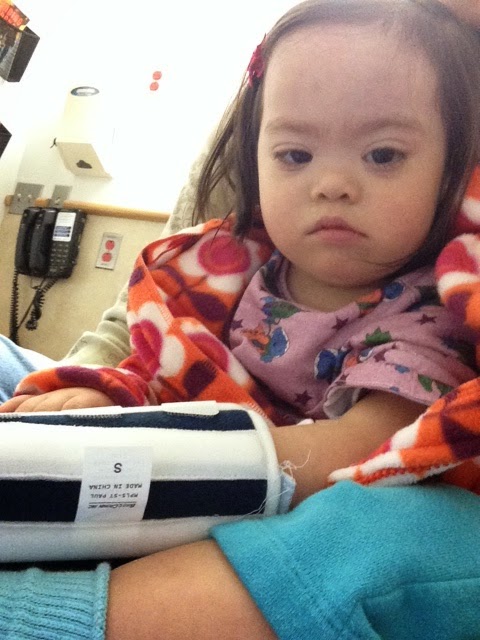She came down with another respiratory infection. This time, she was knocked down with fatigue and no appetite. For a child who loves to eat and eats everything, turning down the yummiest of all yummies was a bad sign.
At the doctor's office, her pulse/ox (measuring oxygen levels in the blood) was very low. The doctor was concerned enough to send us to the ER for chest X-ray and rule out pneumonia. Thankfully, the X-rays showed no pneumonia, just some viral infection. After waiting around for almost 5 hours, we went home for lots of bed rest.
Two days later, we went back to the doctor's office. Bun Bun's breathing wasn't improving. She was still very lethargic and refused to eat.
Back to the ER. This time, we were there to stay. Bun Bun's pulse/ox was even lower. Doctors wanted another X-ray, just be sure there was really no pneumonia. A couple of tubes of blood and snot-suctioning later, RSV was confirmed. Respiratory syncytial virus is usually bad news for babies, especially preemies with poorly developed lungs, and immune-compromised people. Otherwise healthy individuals exhibit typical cold symptoms and recover very quickly. A very small percentage of children with RSV ends up with bronchiolitis; this was Bun Bun. The virus affected the bronchioli, the smaller branches in the lungs, causing inflammation and breathing difficulties.
Four days of being hooked up to pulse/ox monitor, having nurses suck snot out of her nose, IV fluids, constant vital sign check-ups, and eating nothing but crackers, Bun Bun is on the mend. Phew.
For the first time today in over a week, Bun Bun ate her dinner, just half of what she usually eats, but it's a great start.
Modern medicine is truly amazing. I am so thankful that CHOP (Children's Hospital of Philadelphia), one of the best hospitals in the world, is just a 30-minute car ride away. I am so glad that they were able to determine the cause of Bun Bun's illness. Instead of pumping her with antibiotics right away, they waited for a diagnosis. Antibiotics are one of the greatest inventions in the 20th century; collectively, they kill bacteria, but they do not kill viruses. Even though antibiotics do not harm any human cells, they kill the bad bacteria that make us sick but do end up killing the good bacteria in the human gut. Good bacteria have significant benefits. In the intestines, they create what scientists have called the gut microbiome. Research has found that when disturbed may lead to various diseases. Stayed tuned... I have just started reading a book by Martin Blaser, "Missing Microbes."
 |
| First ER visit... I think we watched all 6 episodes of Baby Signing Time, twice! |
 |
| Still managed to smile and laugh a little bit. |
 |
| Not so happy second ER visit. Here, the nurses had put an IV in her hand. Daddy thought her arm reminded him of Hellboy. |
 |
| Poor Bun Bun: so lethargic, only had appetite for hard pretzels and crackers. She's got oxygen cannula going up her nose. She definitely did not like that. |
 |
| The turn-around. Cheese-It's and Curious George: it's a winning combination. |

No comments:
Post a Comment